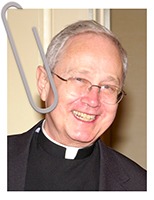In a FamVin post, The Future Pulls the Present, Fr. Tom Mckenna, of the Eastern Province of the Congregation of the Mission, invites us to reflect on how imaging the future impacts our present.
The Future Pulls The Present (Isaiah, 2:1; Mt. 8:10-11)
There once was a member of a swim team who kept losing meets because he was thrown off during races by the turbulence in the water all around him. His coach gave him a piece of advice that made all the difference and lasted well beyond that day. “Before you dive in, get a picture of the finish line in your head; and then while you’re swimming, imagine it’s moving toward you.” That feel for the end line coming at him steadied his strokes, calmed his breathing, and let him win. That experience, the future traveling toward the present, injected extra strength and resolve.
It’s a similar experience that pervades the season of Advent – a presence traveling back from the future and threading itself into the present.
Isaiah’s words “in the days to come” (Is 2:1) set the tone. That’s when the people will climb the Lord’s mountain and enter the Lord’s house. On that future day the terms of earth will finally measure up to God’s terms: wars shall cease, and the sounds of peace will ring inside the walls. That approaching era, as Jesus images it, will see everyone, Jew and Gentile, rich and poor, “reclining with Abraham and Isaac and Jacob at the Kingdom table.” (Mt. 8: 11). Not just a look into the future, this shining image is stirring up energies in the present. It describes that moving finish line which is not only off in the distance, but which is pushing in to energize the here and now.
So Isaiah’s finishing line, “wars shall cease,” injects momentum into all the strategies of peacemaking going on in today’s world. The goal of outsiders coming to sit at the one table is tugged at by the example of the Lord Jesus inviting sinners and tax collectors and Gentiles to dine with him. In other words, the coming that Advent highlights has as much to do with present happenings as future ones, infusing the strength of that future into today’s struggles for justice. It brings new vitality to the laborious efforts to cross ethnic and racial boundaries. Seen for what it really is, this coming of the Kingdom steadies us through the turbulent waters involved in building common understanding and mutual appreciation.
The word itself, Advent (Ad: toward; Vent: coming), lays out the direction of the season. It celebrates not just the future but what of that future is being poured into the present. It leads us to open doors we have preferred to keep closed and nudges us toward wider horizons. It beckons and at the same time reaches back.
Might not St. Vincent’s notion of God’s Providence take on new overtones here? For him, trusting Providence meant following close behind the inspirations of The Spirit. Could it not also include the expectation that The Spirit is moving toward us, that God’s future is already flowing into our present efforts? From this angle we can appreciate how it is that our Vincentian lives operate at the intersection of our own following and God’s provident reaching back.
That swimming coach asked the young man to imagine the finish line moving toward him. More than imagining that the Kingdom is coming toward us, it’s our Advent faith.



Rom 16, 13 reads: "Greet Rufus, chosen in the Lord; and greet his mother—a mother to me also." If this…
Have a blessed Holy Week!
I have never thought about the people that were named in the Gospels. I would agree that they may be…
Generally, I love the laconic nature of Mark's Gospel. The Passion narrative is very compelling in its starkness, with one…
Father John, Blessings to you as you step cautiously down that new path. Grace and Peace be with you!